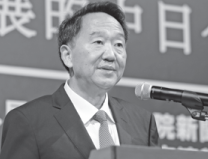Beijing-Tokyo ties deserve brighter future
Updated: 2016-09-28 07:56
By Jiang Jianguo(China Daily)
|
|||||||||
 |
|
Jiang Jianguo.[Photo by Xuxun/China Daily] |
The two countries should abide by the four consensuses they have reached. They must use history as a mirror, look to the future, seek common points of interests and shelve their differences, and prevent conflicts.
Most of the people in the two countries don't have a favorable opinion about each other's countries, as the forum organizers' latest poll shows. Friendly relations between China and Japan form the basis of good relations between their peoples. The current emotional detachment between Chinese and Japanese peoples deserves attention of their respective leaders, especially those attending the forum. In this regard, too, I have four suggestions.
First, we should make good use of think tanks. Cooperation between Chinese and Japanese think tanks is of vital importance to the development of bilateral relations. Many members of think tanks are attending the forum, and they should give valuable suggestions and advice on how to improve Sino-Japanese relations.
An important job of the State Information Office is to promote exchanges and cooperation between Chinese think tanks and their foreign counterparts. We will support regular and institutional exchanges between Chinese and Japanese think tanks and urge them to intensify communication with each other and conduct studies to find out the best possible way to resolve bilateral knotty issues.
Second, we should use media outlets to help improve bilateral ties. Media outlets in the two countries should focus on how to develop bilateral ties, address the common concerns of the two sides, give space and time to reasonable voices and turn government consensus into consensus between the media and the people.
At the Rio Olympic Games, the Chinese media played a positive role by highlighting Japanese ping-pong player Ai Fukuhara's performance, and the Japanese media extensively covered Chinese swimmer Fu Yuanhui's interviews and Chinese women volleyball team's achievement. The popularity of the two athletes and the Chinese women volleyball team in both Japan and China reflected the potential of cultivating people-to-people relations and showed the important role media outlets can play in improving bilateral ties.
Third, we should allow enterprises to play a bigger role to improve Sino-Japanese ties. The G20 Summit in Hangzhou proposed a new global economic governance concept, based on equality, opening-up and cooperation. It advocated the development of a fair and efficient new global economic governance pattern to boost global growth and facilitate the transformation of the world economy.
China's economic transformation and deep involvement in globalization will create business, investment and cooperation opportunities for the world, including Japanese entrepreneurs. Enterprises from China and Japan should seize this opportunity to deepen cooperation, so as to consolidate the foundation of Sino-Japanese relations.
Fourth, China and Japan should work together to increase people-to-people exchanges. The two countries have a long history in this regard. Japan used to send many officials and envoys to study in China during the Sui Dynasty (AD 581-618) and the Tang Dynasty (AD 618-907). In the late 19th and early 20th centuries, many Chinese people studied in Japan to learn from Japan's experience.
Last year, Chinese people made more than 5 million trips to Japan. Since 2010, China's State Information Office has been organizing three batches of young journalists from Chinese media outlets to visit Japan every year. And the Chinese government will invite 80 young Japanese journalists from Japan's media outlets to visit China every year from this year.
We want Sino-Japan relations to return to the right track. Hopefully, the organizers of the Beijing-Tokyo Forum and the participants will make joint efforts to mobilize civil society in the two countries to help minds think deeply, the mouths speak more clearly, the legs walk more steadily and the hands hold other's hands more tightly to bridge the gap between the hearts of the two peoples, and help improve Sino-Japanese relations.
Related Stories
Japan should heed call of reason from China 2016-09-28 07:20
Abe amends Japan's pacifist Constitution 2016-09-27 07:58
Earthquakes rock Okinawa, Hokkaido prefectures in Japan 2016-09-26 14:06
China, Japan need to shelve disputes and live with each other 2016-09-26 08:19
Today's Top News
Premier warmly welcomed by Fidel Castro
Poll suggests Clinton winner of 1st presidential debate
Top official: China goes beyond its own interests
Russian ice creams hot in China
Renminbi use surges in London in spite of Brexit
The meeting of Two Pagodas in Kew Gardens
Kids in tow, Prince William starts Canadian tour
Dancing and drinking during Munich Oktoberfest
Hot Topics
Lunar probe , China growth forecasts, Emission rules get tougher, China seen through 'colored lens', International board,
Editor's Picks

|

|

|

|

|

|







